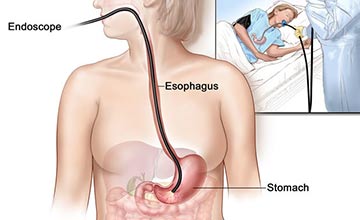Procedures
The most important point to remember is that everyone with a bowel problem can be helped and many can be completely cured.
Whenever possible, we offer procedures using minimally invasive techniques.

About Gastroscopy
Gastroscopy is a procedure where a thin, flexible tube called an endoscope is used to look inside the oesophagus (gullet), stomach and first part of the small intestine (duodenum).
Indications
A gastroscopy is indicated for the following:
Preparation
Patients are asked not have anything to eat for at least six hours before the procedure. Small amounts of clear water are allowed until two hours before the appointment time. This is to ensure that your stomach is empty a clear view is obtained during the test.
Procedure details
The gastroscopy usually takes 5-7 minutes to complete, but longer if treatment for bleeding or blockage is performed. The vast majority of gastroscopies are performed without sedation.
The patient lies on his/her left-hand side and a small plastic mouth guard is placed between the teeth. The endoscopist starts the test by placing the lubricated endoscope into the mouth, then down the back of the throat into the oesophagus. One can feel some gentle pushing and air being put inside as the endoscope moves into the stomach and duodenum. This air will be removed at the end of the test.
The endoscopist may decide to take one or more samples of the lining of the oesophagus/stomach/duodenum for laboratory testing or for testing for Helicobacter pylori, a bacteria that lives in the stomach and can cause inflammation in the lining of the stomach or even ulcers in the stomach or duodenum.
After the procedure
If the test is performed without sedation patients are able to go home almost straight away. When sedation is used, patients need to stay in the recovery area for about 1 hour afterwards. In cases where treatment for bleeding or blockage is performed the stay in the recovery room is a little longer so that nurses have time to look for any signs of complications.
Patients who do not have sedation can return to work straight away; those who have sedation should be well enough to return to work after 24 hours.
Complications
Approximately one complication occur every 1000 gastroscopies. The major complications of are as follows:
Cardiopulmonary events make up 50% of all major complications; such events are usually caused by the medications used for conscious sedation.
